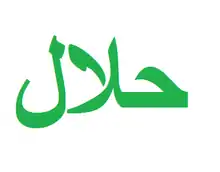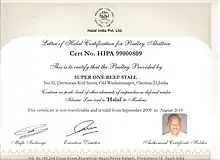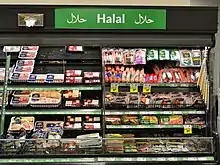Halal
Halal (/həˈlɑːl/; Arabic: حلال, ḥalāl; also spelled halaal) is an Arabic word that translates to "permissible or lawful" into English.

In the Quran, the word halal is contrasted with haram (forbidden). This binary opposition was elaborated into a more complex classification known as "the five decisions": mandatory, recommended, neutral, reprehensible and forbidden.[1] Islamic jurists disagree on whether the term halal covers the first two or the first four of these categories.[1] In recent times, Islamic movements seeking to mobilize the masses and authors writing for a popular audience have emphasized the simpler distinction of halal and haram.[2][3]
The term halal is particularly associated with Islamic dietary laws and especially meat processed and prepared in accordance with those requirements.
In the Quran
The words halal and haram are the usual terms used in the Quran to designate the categories of lawful or allowed and unlawful or forbidden. In the Quran, the root h-l-l denotes lawfulness and may also indicate exiting the ritual state of a pilgrim and entering a profane state. In both these senses, it has an opposite meaning to that conveyed by the root h-r-m (cf. haram and ihram). In a literal sense, the root h-l-l may refer to dissolution (e.g., breaking of an oath) or alighting (e.g., of God's wrath). Lawfulness is usually indicated in the Quran by means of the verb ahalla (to make lawful), with God as the stated or implied subject.[3]
Foods
Several food companies offer halal processed foods and products, including halal foie gras, spring rolls, chicken nuggets, ravioli, lasagna, pizza and baby food.[4] Halal ready meals are a growing consumer market for Muslims in Britain and America and are offered by an increasing number of retailers.[5] Vegetarian cuisine is halal if it does not contain alcohol.
The most common example of haram (non-halal) food is pork. While pork is the only meat that categorically may not be consumed by Muslims (the Quran forbids it,[6] Surah 2:173 and 16:115)[7][8] other foods not in a state of purity are also considered haram. The criteria for non-pork items include their source, the cause of the animal's death and how it was processed.
Muslims must also ensure that all foods (particularly processed foods), as well as non-food items like cosmetics and pharmaceuticals, are halal. Frequently, these products contain animal by-products or other ingredients that are not permissible for Muslims to eat or use on their bodies. Foods which are not considered halal for Muslims to consume include blood[9] and intoxicants such as alcoholic beverages.[10] A Muslim who would otherwise starve to death is allowed to eat non-halal food if there is no halal food available.[8][11] During airplane flights Muslims will usually order kosher food (if halal food is not available) to assure their chosen dish will not have any pork ingredients.
Opinions on GMO foods are mixed, although there is no widely accepted prohibition from consuming them.[12] Some clerics and scholars have expressed support, arguing that such food production methods are halal because they contribute to human wellbeing.[13][14] Voices in opposition to GMOs argue, that there is no need for genetic modification of food crops because God created everything perfectly and man does not have any right to manipulate anything that God has created.[12] Some others have raised concern about the theoretical consumption of specific GMO foods produced using genes from pigs.[15]
Certification

Halal food certification has been criticized by anti-halal lobby groups and individuals on social media,[16] who claim that certifying foods as halal leads to consumers subsidising a particular religious belief.[17] Australian Federation of Islamic Councils spokesman Keysar Trad told a journalist in July 2014 that this was an attempt to exploit anti-Muslim sentiments.[18]
Business
The Dubai Chamber of Commerce estimated the global industry value of halal food consumer purchases to be $1.1 trillion in 2013, accounting for 16.6 percent of the global food and beverage market, with an annual growth of 6.9 percent.[19] Growth regions include Indonesia ($197 million market value in 2012) and Turkey ($100 million).[20] The European Union market for halal food has an estimated annual growth of around 15 percent and is worth an estimated $30 billion.[4] Approximately $8 billion of which are accounted for in France.[21]
The halal food and beverage industry has also made a significant impact on Supermarkets and other food business such as restaurants. French supermarkets had halal food sales totaling $210 million in 2011, a 10.5% growth from 5 years prior. In France, the market for halal foods is even larger than the market for other types of common foods. For example, in 2010, the market for halal foods and beverages in France was nearly twice that of organic foods.[21] Auchan, a large French supermarket chain, now sells 80 certified halal meat products, along with 30 pre-cooked halal meals and 40 frozen halal products. Upscale restaurants and catering services have also added halal foods to their menus. In addition, many beverage companies such as Evian have taken the effort to add a halal stamp on their products to show that their water and other beverages are pure and not haram, or forbidden under Islamic law.[22]
Method of slaughter

The food must come from a supplier that uses halal practices. Dhabīḥah (ذَبِيْحَة) is the prescribed method of slaughter for all meat sources, excluding fish and other sea-life, per Islamic law. This method of slaughtering animals consists of using a sharp knife to make an incision that cuts the front of the throat, oesophagus and jugular veins but not the spinal cord.[23] The head of an animal that is slaughtered using halal methods is aligned with the qiblah. In addition to the direction, permitted animals should be slaughtered upon utterance of the Islamic prayer Bismillah.[24]
The slaughter can be performed by a Muslim or an adherent of religions traditionally known as People of the Book (Jews, Christians and Sabians).[25][24] Blood must be drained from the veins. Carrion (carcasses of dead animals, such as animals who died in the wild) cannot be eaten.[8] Additionally, an animal that has been strangled, beaten (to death), killed by a fall, gored (to death), savaged by a beast of prey (unless finished off by a human), or sacrificed on a stone altar cannot be eaten.[26]
The animal may be stunned prior to having its throat cut. The UK Food Standards Agency figures from 2011 suggest that 84% of cattle, 81% of sheep and 88% of chickens slaughtered for halal meat were stunned before they died. Supermarkets selling halal products also report that all animals are stunned before they are slaughtered. Tesco, for example, says "the only difference between the halal meat it sells and other meat is that it was blessed as it was killed."[27] Concerns about animal suffering from slaughter without prior stunning has resulted in the ban of slaughter of unstunned animals in Denmark, Luxembourg, Belgium, The Netherlands, Norway, Sweden and Switzerland.[28][29] Generally, killing animals in Islam is only permissible for two main reasons, to be eaten[30] and to eliminate a danger, e.g. a rabid dog.[31]
Meat slaughtered or prepared by People of the Book
Animals slaughtered by Christians or Jews is halal only if the slaughter is carried out by jugular slice, it is mentioned before slaughter that the purpose is of permissible consumption, the slaughter is carried out following the name of the God (indicating that you are grateful for God's blessings). The requirement to invoke God's name is a must. In other words, the word ṭaʻām refers to dhabīḥah meat; i.e., the meat prepared after the slaughter of an animal by cutting the throat (i.e., the jugular vein, the carotid arteries, and the trachea) and during slaughter God's name is invoked (Ibn ʻAbbās, Mujāhid, ʻIkrimah all quoted by Ṭabarī, Ibn Kathīr).[23]
Kosher meats are permitted to be eaten by Muslims.[32] This is due to the similarity between both methods of slaughter and the similar principles of kosher meat which are observed by Jews.[33]
Lifestyle and tourism
Halal lifestyle can include travel, finance, clothing, media, recreation, cosmetics and halal food and diet.[34]
Non-food products
Albeit rare in the west, the Halal certification may also be applied to products like cosmetics and medication.
Pharmaceuticals
Some Muslims refrain from using pharmaceuticals that are not Halal. This distinction is most noticably practiced in Malaysia,[35] which has a large Halal pharmaceutical industry, complete with government regulations to make sure the products are Tayyib.[36] On the other hand, the Quran obliges Muslims to seek treatment, including preventive ones, for diseases regardless of what the care provider believes in.[37] In particular, medicines containing animal products like gelatin has been deemed permissible by a 1995 council of Islamic jurisprudents, making such distinction unnecessary.[38] The decentralized nature of Islam allow both opinions to exist.
The controversy over pharmaceuticals has lead to refusal of childhood vaccination in some Muslim-majority countries,[39] despite many religious leaders expressly endorsing vaccination.[40] It is also a concern in the rollout of the COVID-19 vaccine.[37][41][42]
Personal care
Feminine hygiene products and diapers have been certified as halal in Malaysia. Such certification is not required by the religion, nor is there a demand from Muslims. Critics consider such "unnecessary" certification a marketing gimmick, similar to halal labels on clearly vegetarian soft drinks.[43]
Halal in UK shops
As of August 2012, an estimated 27 UK Tesco supermarkets, in addition to most urban Asda and many Morrisons supermarkets, have halal meat counters, selling meat approved for consumption by Muslims.[44] According to the Food Standards Agency Animal Welfare Update report, published September 2017, 16 percent of animals slaughtered by the Halal method were not stunned before slaughter, which violates RSPCA standards on animal welfare.[45] However, it is legal in the UK due to an exemption in the law granted to Jews and Muslims.[46]
EU court ruling on halal
On 17 December 2020, the Court of Justice of the European Union ruled that member countries may ban religious slaughter in order to promote animal welfare and could impose non-lethal stunning before the killing of animals. The ruling was in response to a challenge to a 2017 Flemish government prohibition on the killing of animals without prior non-lethal (also called reversible) stunning by Jewish and Muslim associations.[47]
See also
- Al-Jamia, Shia text which contains all the details of halal things.
- Christian dietary laws
- Dhabīḥah
- DIALREL
- Halal certification in Australia
- Halal certification in Europe
- Indonesian Ulema Council
- Islamic dietary laws
- Istiḥlāl
- Islamic ethics
- Ital
- Jhatka
- Kashrut (Jewish dietary laws)
- List of foods
- Majlis Ugama Islam Singapura
- Makrūh
- Mubāḥ
- Sattvic diet
- Scottish pork taboo
- Taboo food and drink
References
- Vikør, Knut S. (2014). "Ḥalāl". In Emad El-Din Shahin (ed.). Sharīʿah. The Oxford Encyclopedia of Islam and Politics. Oxford University Press. ISBN 9780195305135. Retrieved 18 May 2017.
- Juan Eduardo Campo, ed. (2009). "Halal". Encyclopedia of Islam. Infobase Publishing. p. 284.
- Lowry, Joseph E (2006). "Lawful and Unlawful". In Jane Dammen McAuliffe (ed.). Encyclopaedia of the Qurʾān. Brill. doi:10.1163/1875-3922_q3_EQCOM_00107.
- "USDA Foreign Agricultural Service – Halal Food Market" (PDF). Retrieved 30 August 2016.
- "Halal la carte". The Economist. ISSN 0013-0613. Retrieved 31 August 2016.
- "Pork (لَحم الخنزير) From the Quranic Arabic Corpus – Ontology of Quranic Concepts". Retrieved 29 December 2015.
- "Surah Al-Baqarah [2:173]". Surah Al-Baqarah [2:173]. Retrieved 7 September 2018.
- "Surah An-Nahl – The Noble Qur'an – القرآن الكريم".
- Quran Surah Al-Maaida ( Verse 3 )
- Quran Surah Al-Maidah ( Verse 90 )
- Maqsood, Rubaiyat Waris (2004). Islam. Teach Yourself World Faiths. London: Hodder & Stoughton. p. 204. ISBN 978-0-340-60901-9.
- Omobowale EB, Singer PA, Daar AS. (2009) The three main monotheistic religions and gm food technology: an overview of perspectives. BMC Int Health Hum Rights. 2009 Aug 22;9:18.
- Agricultural Innovation and Agri-Biotechnology in Islamic Shariah
- Farming Future Bangladesh (FFB)
- Islam and GMOs Archived 30 April 2009 at the Wayback Machine
- Hansen, Damien (7 March 2012). "Halal Certification Stamp – Today Tonight (Australia)". Today Tonight. Retrieved 20 February 2015.
- Johnson, Chris (28 December 2014). "Why halal certification is in turmoil". The Sydney Morning Herald. Retrieved 8 January 2015.
- Masanauskas, John (18 July 2014). "Halal food outrage from anti-Islam critics". Herald Sun. Retrieved 6 January 2015.
- "Dubai Chamber Report shows increasing preference for halal food as global market grows to US$1.1 trn | Zawya". www.zawya.com. Retrieved 31 August 2016.
- "REPORT: Consumer Demand for Halal is on the Rise". www.fdfworld.com. Retrieved 31 August 2016.
- "Halal Food Market". Gain.fas.usda.gov, Growth Agricultural Information Network, 15 November 2015, gain.fas.usda.gov/Recent GAIN Publications/Halal Food Market_Paris_France_11-15-2013.pdf. Accessed Nov.2018 1:00 pm
- Baume, Maïa de la (8 September 2010). "Halal Food in France Takes an Upscale Turn". The New York Times. ISSN 0362-4331. Retrieved 8 November 2019.
- "Islamic Method of Slaughtering – Department of Halal Certification". halal certification.ie.
- Qasmi, Qazi Mujahidul Islam (1 January 2009). The Islamic Concept of Animal Slaughter: احكام الذبيحة من المنظور الاسلامي [انكليزي] ترجمة. Dar Al Kotob Al Ilmiyah دار الكتب العلمية. p. 44:47. ISBN 978-2-7451-6060-7.
- Josef Meri, ed. (2016). The Routledge Handbook of Muslim-Jewish Relations. Routledge. p. 311. ISBN 9781317383208.
- [Quran 5:3]
- Eardley, Nick (12 May 2014). "What is halal meat?" – via www.bbc.co.uk.
- Sekularac, Ivana (28 June 2011). "Dutch vote to ban religious slaughter of animals". Reuters. Retrieved 26 January 2015.
- "Comment: Danish halal, kosher ban leaves religious groups with nowhere to turn". Special Broadcasting Service. 25 February 2014. Retrieved 26 January 2015.
- Sunan an-Nasa'i 4349, Book:42, Hadith:87;Quran (40:79)
- Sahih al-Bukhari 3314, Book:59, Hadith:120
- "Lawful Foods". Just Islam. Retrieved 2 May 2014.
Now in the case of Jews this is very easy. As long as the Jew is a practicing Jew and the meat is slaughtered in accordance with Jewish law (Torat Moshe) then this meat and other Kosher food is lawful (halal) and can be eaten by Muslims.
- "Islamic ruling on Christian food". islamqa. Retrieved 26 August 2012.
- "Halal Lifestyle in Indonesia – UN World Tourism Organization" (PDF). Retrieved 30 August 2016.
- "Halal And Haram Medicines (Islamic Perspective)". PORTAL MyHEALTH. 8 November 2016.
- Prospects of Halal Pharmaceuticals
- Hussain, Shadim (27 November 2020). "Why are some Muslims suspicious of a COVID-19 vaccine?". ABC Religion & Ethics.
- Gezairy HA (17 July 2001). "(Form letter EDB.7/3 P6/61/3)" (PDF). World Health Organization, Regional Office for the Eastern Mediterranean. Retrieved 12 May 2009.
- Ahmed, Ali; Lee, Kah S.; Bukhsh, Allah; Al-Worafi, Yaser M.; Sarker, Md. Moklesur R.; Ming, Long C.; Khan, Tahir M. (March 2018). "Outbreak of vaccine-preventable diseases in Muslim majority countries". Journal of Infection and Public Health. 11 (2): 153–155. doi:10.1016/j.jiph.2017.09.007.
- "Religious Views of Vaccination At-A-Glance" (PDF). Maine Chapter, American Academy of Pediatrics.
- "Birmingham mosque becomes UK's first to offer Covid vaccine". BBC News. 21 January 2021.
- Paddock, Richard C. (5 January 2021). "Is the Vaccine Halal? Indonesians Await the Answer". The New York Times.
- Malaysian company says halal certification for its diapers, sanitary pads signal safety and quality but experts question motives
- "National Halal Centre". National Halal Food Group. National Halal Food Group. 20 August 2012. Archived from the original on 8 March 2010. Retrieved 20 August 2012.
- "Religious Slaughter – RSPCA". RSPCA. Retrieved 21 March 2019.
- "Halal hysteria". New Statesman. 9 May 2012.
The stunning of livestock before slaughter has been compulsory in the EU since 1979 but most member states, including the UK, grant exemptions to Muslims and Jews.
- Nelsen, Arthur (17 December 2020). "EU states can ban kosher and halal ritual slaughter, court rules". Politico.
Further reading
- Yungman, Limor, "Food", in Muhammad in History, Thought, and Culture: An Encyclopedia of the Prophet of God (2 vols.), Edited by C. Fitzpatrick and A. Walker, Santa Barbara, ABC-CLIO, 2014, Vol I.
External links
| Wikimedia Commons has media related to Halal. |
| Wikibooks Cookbook has a recipe/module on |
- American Halal Association
- Laws of Islam concerning food
- Halal Knowledge Centre
- Halal World certificate
- ASIDCOM report. Benefits of Religious Slaughter
- A Database of halal restaurants in America
- Consumers increasingly perceive kosher and halal food as safer Scientist Live
- Article on Halal and Haram from an Islamic perspective
- (in French) Jurisprudence of the Halal food according to the Mali school (from Sharḥ Muqaddimat al-ʻIzzīyah by Imam al-Ābī al-Azharī)
- List of permitted and prohibited animals
